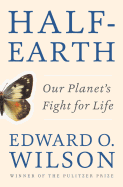
Half-Earth: Our Planet's Fight For Life by Edward O. Wilson (Liveright, $25.95 hardcover, 9781631490828, March 7, 2016)
 Edward O. Wilson (Letters to a Young Scientist) is a famous and sometimes controversial naturalist, a Harvard professor and the Pulitzer-winning author of more than 20 books. Half-Earth is the last book in his trilogy on "how our species became the architects and rulers of the Anthropocene epoch, bringing consequences that will affect all of life... far into the geological future."
Edward O. Wilson (Letters to a Young Scientist) is a famous and sometimes controversial naturalist, a Harvard professor and the Pulitzer-winning author of more than 20 books. Half-Earth is the last book in his trilogy on "how our species became the architects and rulers of the Anthropocene epoch, bringing consequences that will affect all of life... far into the geological future."
His recommendation is a radical one. "I am convinced that only by setting aside half the planet in reserve... can we save the living part of the environment and achieve the stabilization required for our own survival." This reserve would be a web of large protected areas connected by wild corridors that span continents. Wilson estimates that it would protect about 85% of the earth's biodiversity. In comparison, existing reserves cover about "15 percent of Earth's land area and 2.8 percent of Earth's ocean area." Though their creation has saved many species, "the current rate of extinction overall is between one hundred and one thousand times higher than it was originally, and all due to human activity."
It's not that Wilson thinks we can achieve this ideal in the near future. He wants us to think big, to set a noble goal, rather than piddling around with conservation measures that he regards as valuable but ultimately akin to mopping the brow of a dying patient.
In brief chapters, Wilson considers past and ongoing extinctions, their causes, the biodiversity that exists today and how to calculate what existed before. A list of worldwide wilderness hot spots sketches out a starter map for this vast project. He uses two visionary and successful restoration projects in Florida and Mozambique to show how they can be accomplished, and how they can benefit local people as well as wildlife. Some of this material has been covered in his earlier books, but in addition, Wilson aggressively confronts what he calls "Anthropocene enthusiasts," scientists who argue that our world is irreparably changed and we should "recognize that Earth's destiny is to be humanized." This perspective, he says, "is largely a product of well-intentioned ignorance," and he repeatedly emphasizes how millions of species and their interactions remain unnamed and mysterious.
Wilson finds hope in declining human birth rates and technological advances that aid scientific understanding and make us more efficient users of natural resources. And he returns to his conviction that altruism is part of human evolution and can be extended to the natural world. "I believe we've learned enough to adopt a transcendent moral precept concerning the rest of life. It is simple and easy to say: Do no further harm to the biosphere." --Sara Catterall
Shelf Talker: Naturalist Edward O. Wilson makes the case for an ambitious plan to preserve and restore the Earth's biological wealth.

